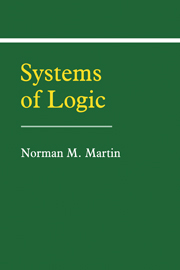Book contents
- Frontmatter
- Contents
- Preface
- 1 Formal Systems and Structure Theory
- 2 Zero-Order Logic: Proof Theory
- 3 Zero-Order Model Theory
- 4 Positive Implication
- 5 Negation
- 6 Complete Implication-Negation Logic
- 7 Disjunction
- 8 Conjunction
- 9 Multi-Connective Systems
- 10 Strict Implications: Introduction
- 11 Strict Implications: Additional Results
- 12 Quantification and First-Order Logic
- 13 Quantification and Complete Logics
- 14 Quantification and Incomplete Logics
- 15 Interpretation of Formal Systems
- Appendix: Historical and Bibliographical Remarks
- Subject Index
- Index of Systems
- Index of Symbols
- Frontmatter
- Contents
- Preface
- 1 Formal Systems and Structure Theory
- 2 Zero-Order Logic: Proof Theory
- 3 Zero-Order Model Theory
- 4 Positive Implication
- 5 Negation
- 6 Complete Implication-Negation Logic
- 7 Disjunction
- 8 Conjunction
- 9 Multi-Connective Systems
- 10 Strict Implications: Introduction
- 11 Strict Implications: Additional Results
- 12 Quantification and First-Order Logic
- 13 Quantification and Complete Logics
- 14 Quantification and Incomplete Logics
- 15 Interpretation of Formal Systems
- Appendix: Historical and Bibliographical Remarks
- Subject Index
- Index of Systems
- Index of Symbols
Summary
Let us turn to the examination of the logical characteristics of the particle represented by “or” and similar words. As usual, the actual results depend only on the rules chosen and hence they are more or less independent of the motivations involved.
While it is clear that the word “or” is used in various ways, including arguably in some cases the denying of the simultaneous acceptability of the sentences connected by it, there is at least one usage or family of usages (frequently called “inclusive or”) for which admission of A commits one against denying or rejecting “A or B,” or for that matter “B or A.” We are actually inclined to believe this to be the basic meaning of “or,” but whether we are right in this or not, it is this inclusive use of “or” which provides the colloquial basis for disjunction, as we shall use the term in this and succeeding chapters.
Our first, rather minimal, system for disjunction will have only one connective, with properties sufficient to make it a normal disjunction in the sense specified in chapter 2.
Information
- Type
- Chapter
- Information
- Systems of Logic , pp. 111 - 130Publisher: Cambridge University PressPrint publication year: 1989
